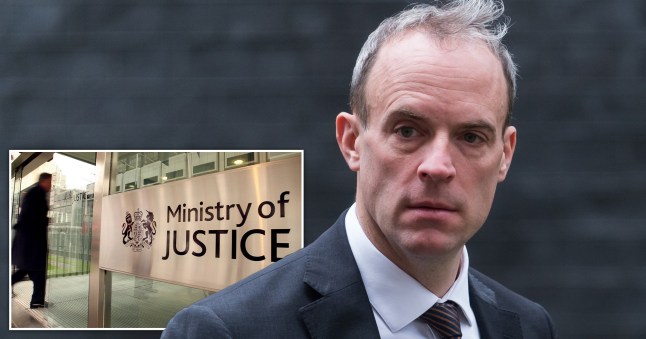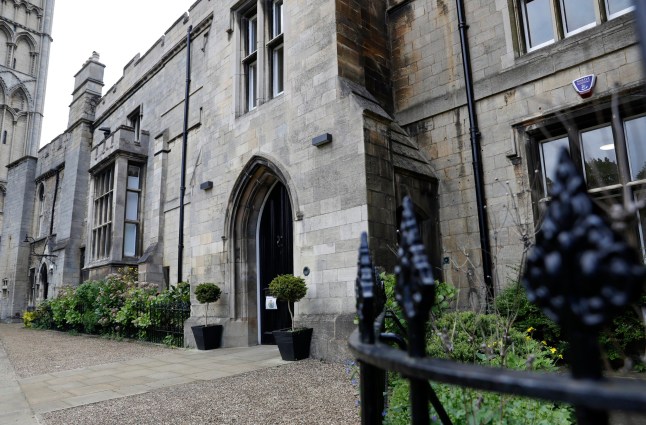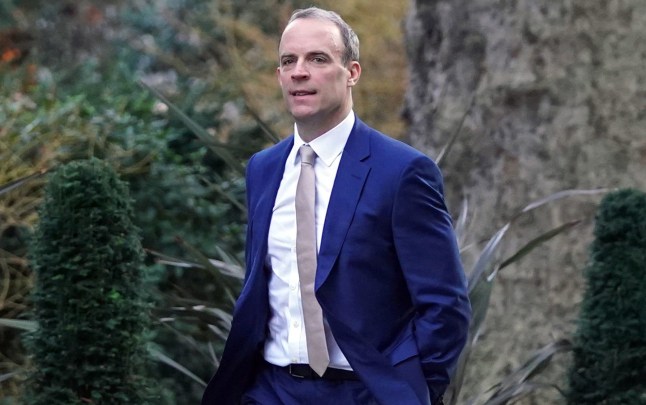
Magistrates will be given powers to impose tougher sentences to help tackle a backlog of criminal cases created by the pandemic.
They will be able to hand jail terms of up to a year — double the current six months — and hear more serious cases such as fraud, theft and assault.
Crimes warranting a prison term of more than six months must be sent to a crown court for sentencing under the current rules.
The move will reduce pressure on the higher courts and could free up to 2,000 extra days of their time, the Ministry of Justice said.
‘This important measure will provide vital additional capacity to drive down the backlog of cases in the crown courts,’ justice secretary Dominic Raab added.
‘Together with the Nightingale Courts, digital hearings and unlimited sitting days, we will deliver swifter and more effective justice as we build back a stronger, safer and fairer society.’

The changes will come into force later this year and only apply to ‘either-way’ offences, which can be dealt with by magistrates or crown courts.
Defendants can still opt to have their case heard by a crown court jury if they wish.
The Justice Secretary has dismissed criticism of his plans, after some labelling them a ‘sticking plaster’ solution and ‘distraction’ politics.
Some have suggested the move could have the opposite effect and add to the backlog in courts.
Human rights barrister and vice chairman of the Criminal Bar Association, Kirsty Brimelow, said the prospect of being jailed for longer by a magistrate could see defendants opt to try their luck with a jury at crown court instead.

She told Radio 4’s Today programme: ‘The issue with a backlog, which was there before the pandemic, is not about sentencing powers – that’s really rearranging the deck chairs.
‘It is about lack of investment in the criminal justice system … it needs money into the system, and it needs barristers who are actually going to prosecute and defend in these cases. And what we’re seeing is a huge attrition of barristers leaving the profession.’
Asked about the idea that more people may elect to go to crown court or appeal against longer sentences handed by magistrates, Mr Raab told the Today programme: ‘No, I don’t accept that. We looked at this very carefully.
‘This measure … will mean cases can come to court quicker, which means greater justice for victims, more criminals seeing justice earlier. Our estimate is it will reduce the strain on the crown courts by around 1,700 cases.’
More Trending
A survey of CBA members showed 96.5%, of 1,967 who responded, are willing to ‘take action now’ – meaning barristers could go on strike – if there is not a ‘substantial’ increase in criminal legal aid fees.
This is what the Ministry of Justice should be focusing on instead of ‘trying to fiddle with powers of magistrates courts,’ Ms Brimelow said.
She added: ‘If you don’t have the lawyers actually defending or prosecuting in these cases, these cases are not going to go anywhere.’
Mr Raab said ‘we want to work’ with the CBA, telling the BBC: ‘The one thing that would hold back recovery in the court system is if the Criminal Bar Association and criminal lawyers go on strike, and I don’t think that will be supported across the wider sectors of the justice system, and I certainly don’t think that will be supported by the public.’

Training on the new changes will be provided by the Judicial College to make sure the powers are used ‘consistently and appropriately’.
An amendment to the Judicial Review and Courts Bill will mean the Government will have powers to reverse the change if needed.
Last year, Whitehall’s spending watchdog the National Audit Office warned the criminal courts backlog would ‘remain a problem for many years’.
It came after the number of outstanding cases in the crown courts reached record highs of almost 61,000 and more than 364,000 in magistrates’ courts before beginning to slowly reduce.
MORE: Government defeated as Lords vote to remove parts of controversial policing bill
MORE: US lawmaker compares Covid vaccine passports to Nazi ID cards, gets blasted by Auschwitz Museum
MORE: What’s next for Prince Andrew after failing to have sex lawsuit thrown out
Get in touch with our news team by emailing us at webnews@metro.co.uk.
For more stories like this, check our news page.











